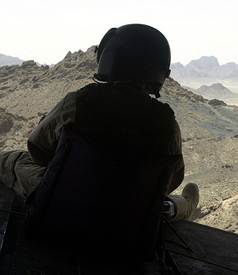The Middle East: Victory Is Obsolete
Monday 26 October 2009
by: Winslow Myers, t r u t h o u t | Op-Ed

Is military victory in the Middle East an obsolete concept? (Photo: US Army /flickr)
In his October 14 op-ed piece in the Boston Globe, Jeff Jacoby affirms his agreement with Daniel Pipes that "wars end not through good will but through victory, defining victory as one side compelling the other to give up its war goals. Since 1948, the Arabs' goal has been the elimination of Israel; the Israelis' to win their neighbors' acceptance of a Jewish state in the Middle East. If the conflict is to end, one side must lose and one side win."
This way of putting the dilemma has the virtue of clarity. But there virtue ends. "Acceptance" of a Jewish state is utterly unlikely to follow from "victory" as Pipes defines it. Genuine acceptance, especially mutual acceptance, cannot and will not flow from one side compelling the other to do anything.
Acceptance of each other can only follow from acceptance of some bigger realities that form an inescapable context for both sides. The first reality is that they each equally perceive themselves as fighters for a just cause. It is futile to try to force people who carry a torch against what they are sure is unjust to move from resentment to acceptance. This forcing, by either side, carries a dark and ironic connotation of extermination - of ideas, values and hopes, if not of actual people.
A second reason victory and acceptance are incompatible also concerns potential extermination. Victory and acceptance belong to two completely different paradigms, one pre-nuclear and one post-nuclear. The very concept of "victory" in an age of genocidal weapons is passing into obsolescence. Perhaps victory as Pipes defines it is still possible in certain more "provincial" situations. The recent defeat of the Tamil Tigers comes to mind.
But the challenge in the Mideast is different, not least because all the great powers could be drawn in, precipitating another world war. The situation is not static, but time-developmental: it is not hard to see into a future where weapons of mass destruction continue to proliferate. With every passing decade, more weapons are built and more nations think they need them to be safe. Somewhere down the line Armageddon looms, with visions of radioactive clouds drifting from the detonations back onto whoever initiated them, blocking the sun and shutting down agriculture for months or years. No victory there.
The only way out is to redefine victory and acceptance on the basis of the actual historical reality of the past and the nuclear reality of the future that will be unavoidable unless there is a reorientation of hearts and minds. The Arabs can learn to feel the tragic existential necessity, rooted in the Holocaust, of Israel's birth, and Israel can learn to feel the tragic injustice of the fate of Palestine.
The most powerful means for that to happen may lie not in the hands of governments and treaty signers, but in what has been called "the public peace process": groups of Israelis and Palestinians convincing themselves that victory is obsolete and instead coming together to hear each other's stories. Only then can they forge new relationships on the basis of their common tragedy and common destiny.
For twenty years, Libby and Len Traubman, a social worker and a pediatric dentist from San Mateo, California, have been inviting small groups of American Jews and Palestinians to share meals and dialogue together. This simple idea has spread to churches, synagogues, mosques, schools and summer camps for teens. In these humble venues, the peace process, far from being doomed, is planting the seeds of a more hopeful future.
No comments:
Post a Comment